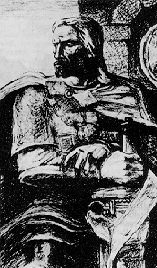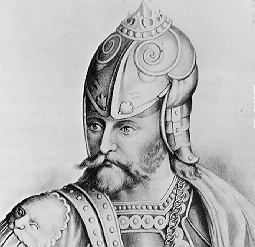Minsk History:
Minsk and the Principality of Polacak
Rahvalod's daughter Rahnieda(Norse: Ragnheid) was baptized; she became the wife
of Prince Volodimir(Norse: Valdemar) of Kiev and bore him a son Iziaslau. Volodimir
was baptized a Christian by missionaries from Constantinople in 988; the population of
Polacak accepted Christianity in 989, and by 992 the city had its Bishop. On the death of
Volodimir, Iziaslau' became Prince of Polacak, and his half-brother Jaraslav --
Volodimir's son by a previous marriage -- became Prince of Novgorod and later of Kiev.
Other sons acquired his domains among the Finno-Ugric tribes of what was to become
Muscovy. "Since that time, as the chronicler recorded, "the grandchildren of
Rahvalod raised the sword agains the grandchildren of Jaroslav". From the outset
there was little unity between the warring princes of "Rus'". Iziaslau'(d. 1001)
was succeeded by his son Braczaslau, who it turn was followed by his son Usiaslau the
Enchanter (1044 - 1101).
Usiaslau the Enchanter
 The
dynastic rivalry between the houses of Kiev and Polacak explains the turbulent history of
Minsk in its early years, situated as it was on the southern borders of the latter
principality. The center of the town had shifted to a new cite giving access to the
headwaters of the Vilija and Biarazima and the confluence of the Niamiha and Svisloch
rivers. Here also the steep banks of the Niamiha, the high mound south of the stream and
Trinity Golden hill offered a good defensive position. Public buildings, dwelling houses,
and fortifications were raised of timber. The first recorded mention of Minsk in 1066
relates however to dynastic wars with Kiev. After Usiaslau of Polacak had raided Novgorod
and brought to his capital the bells of the Cathedral of St. Sophia, to hang them in his
own Cathedral of that name, the three sons of Jaraslav in retribution attacked the city of
Minsk: "The people of Menesk(Minsk) barricaded themselves in the town, but the three
brothers took Menesk and killed the men, carried off the women and children into
captivity, and went towards the Niamiha".
The
dynastic rivalry between the houses of Kiev and Polacak explains the turbulent history of
Minsk in its early years, situated as it was on the southern borders of the latter
principality. The center of the town had shifted to a new cite giving access to the
headwaters of the Vilija and Biarazima and the confluence of the Niamiha and Svisloch
rivers. Here also the steep banks of the Niamiha, the high mound south of the stream and
Trinity Golden hill offered a good defensive position. Public buildings, dwelling houses,
and fortifications were raised of timber. The first recorded mention of Minsk in 1066
relates however to dynastic wars with Kiev. After Usiaslau of Polacak had raided Novgorod
and brought to his capital the bells of the Cathedral of St. Sophia, to hang them in his
own Cathedral of that name, the three sons of Jaraslav in retribution attacked the city of
Minsk: "The people of Menesk(Minsk) barricaded themselves in the town, but the three
brothers took Menesk and killed the men, carried off the women and children into
captivity, and went towards the Niamiha".
Treacherously seized whilst attending a parley in Smalensk with Isiaslau and the
princes of Kiev in 1067, Usiaslau and his two sons were kept captive in Kiev, until an
uprising of the inhabitants set them free. Prince Usiaslau fled to Poland, and the Prince
of Polacak was offered the throne of Kiev in his stead. The story goes that Usiaslau'
longed to return home, and declined the honor for the love of his native land. He was, as
the chronicler records, called back to Polacak "by the pealing bells of St.
Sophia". The first uncensored Belarusian historical opera performed in Minsk: Usiaslau
the Enchanter, Prince of Polacak (1944) by the composer Kulikovicz dealt with this
romantic theme. The bells of St. Sophia were to become for Belarusian exiles the symbol of
the call of the homeland.
Usiaslau principality of Polacak was, on his death, divided between his sons: the
fiefdom of Minsk fell to Hleb, who thus became the first sovereign prince of the city.
Internecine quarrels weakened the northern principalities and encouraged the Kievans to
reopen hostilities. In 1104 they ravaged the principality of Minsk and shortly thereafter
the warlike Lithuanians moved in from the west. Vladimir Monomach again besieged and took
Minsk in 1116. Three years later in a further campaign against Polacak, after a battle on
the banks of Biarazina, the Kievans "attacked the town, and left neither man nor
beast in it".Prince Hleb Usiaslavavicz, together with his two sons, Rascilau and
Valadar, was taken into captivity, where he died in exile later that year. He was
succeeded by his son Rascislau, but yet again the Kievans attacked in 1129, and placed
their nominee Isiaslau Mscislavicz on the throne dispatching Gleb children to serve the
Byzantine Emperor in Constantinople.
The Grand Duke Hedymin
 However, the principality reverted to the princes of Polacak in 1146, with the return of
the two sons of Hleb, Rascilau and after him Valadar(1151 - 1158), though Syrakomla gives
different dates and the chronicles for this period are incomplete. On the death of the
latter prince, Minsk is though to have been governed by Valadar's son Prince Vasylka, at
least until 1195. During the reign of the Grand Duke Mindauh(c. 1200 - 1263) of Lithuania,
Polacak entered into an alliance with him to expel the Baltic Germans, who had invaded the
principality. Thereafter, it appears to have become a Lithuanian appanage, for by 1220 the
overlord of Minsk was Prince Edzivil, a nephew of Mindauh. Minsk continued as a
semi-independent principality allied with Lithuania, for as late as 1326 the records
mention a Prince Todar Svjataslavavicz of Minsk as a witness to a treaty between the Grand
Duke Hedymin(d. 1341) and the city-state of Novgorod.
However, the principality reverted to the princes of Polacak in 1146, with the return of
the two sons of Hleb, Rascilau and after him Valadar(1151 - 1158), though Syrakomla gives
different dates and the chronicles for this period are incomplete. On the death of the
latter prince, Minsk is though to have been governed by Valadar's son Prince Vasylka, at
least until 1195. During the reign of the Grand Duke Mindauh(c. 1200 - 1263) of Lithuania,
Polacak entered into an alliance with him to expel the Baltic Germans, who had invaded the
principality. Thereafter, it appears to have become a Lithuanian appanage, for by 1220 the
overlord of Minsk was Prince Edzivil, a nephew of Mindauh. Minsk continued as a
semi-independent principality allied with Lithuania, for as late as 1326 the records
mention a Prince Todar Svjataslavavicz of Minsk as a witness to a treaty between the Grand
Duke Hedymin(d. 1341) and the city-state of Novgorod.
The fall of Kiev to the Mongols in 1240 during the great invasion of Batu Khan, the
submission of Jaroslav, the Grand Duke of Moscow, to the Tatars in 1243 and the Lithuanian
victory over the Asian invaders first at Kojdanava(1241) under Prince Skirmunt and then at
Kruta Hora (1249) a few miles from Minsk, served to consolidate the union between the
Belarusian principalities and the Grand Duchy. In 1252 Mindauh and his his leading nobles
were baptized, and the Grand Duke was crowned with the approval of Pope Innocent IV in
1253. He fixed his capital in the Belarusian city of Navahrudak, some 100 km west from
Minsk.
![[Previous]](../../images/misc/previous.gif)
![[Up]](../../images/misc/up.gif)
![[Next]](../../images/misc/next.gif)
 The
dynastic rivalry between the houses of Kiev and Polacak explains the turbulent history of
Minsk in its early years, situated as it was on the southern borders of the latter
principality. The center of the town had shifted to a new cite giving access to the
headwaters of the Vilija and Biarazima and the confluence of the Niamiha and Svisloch
rivers. Here also the steep banks of the Niamiha, the high mound south of the stream and
Trinity Golden hill offered a good defensive position. Public buildings, dwelling houses,
and fortifications were raised of timber. The first recorded mention of Minsk in 1066
relates however to dynastic wars with Kiev. After Usiaslau of Polacak had raided Novgorod
and brought to his capital the bells of the Cathedral of St. Sophia, to hang them in his
own Cathedral of that name, the three sons of Jaraslav in retribution attacked the city of
Minsk: "The people of Menesk(Minsk) barricaded themselves in the town, but the three
brothers took Menesk and killed the men, carried off the women and children into
captivity, and went towards the Niamiha".
The
dynastic rivalry between the houses of Kiev and Polacak explains the turbulent history of
Minsk in its early years, situated as it was on the southern borders of the latter
principality. The center of the town had shifted to a new cite giving access to the
headwaters of the Vilija and Biarazima and the confluence of the Niamiha and Svisloch
rivers. Here also the steep banks of the Niamiha, the high mound south of the stream and
Trinity Golden hill offered a good defensive position. Public buildings, dwelling houses,
and fortifications were raised of timber. The first recorded mention of Minsk in 1066
relates however to dynastic wars with Kiev. After Usiaslau of Polacak had raided Novgorod
and brought to his capital the bells of the Cathedral of St. Sophia, to hang them in his
own Cathedral of that name, the three sons of Jaraslav in retribution attacked the city of
Minsk: "The people of Menesk(Minsk) barricaded themselves in the town, but the three
brothers took Menesk and killed the men, carried off the women and children into
captivity, and went towards the Niamiha".  However, the principality reverted to the princes of Polacak in 1146, with the return of
the two sons of Hleb, Rascilau and after him Valadar(1151 - 1158), though Syrakomla gives
different dates and the chronicles for this period are incomplete. On the death of the
latter prince, Minsk is though to have been governed by Valadar's son Prince Vasylka, at
least until 1195. During the reign of the Grand Duke Mindauh(c. 1200 - 1263) of Lithuania,
Polacak entered into an alliance with him to expel the Baltic Germans, who had invaded the
principality. Thereafter, it appears to have become a Lithuanian appanage, for by 1220 the
overlord of Minsk was Prince Edzivil, a nephew of Mindauh. Minsk continued as a
semi-independent principality allied with Lithuania, for as late as 1326 the records
mention a Prince Todar Svjataslavavicz of Minsk as a witness to a treaty between the Grand
Duke Hedymin(d. 1341) and the city-state of Novgorod.
However, the principality reverted to the princes of Polacak in 1146, with the return of
the two sons of Hleb, Rascilau and after him Valadar(1151 - 1158), though Syrakomla gives
different dates and the chronicles for this period are incomplete. On the death of the
latter prince, Minsk is though to have been governed by Valadar's son Prince Vasylka, at
least until 1195. During the reign of the Grand Duke Mindauh(c. 1200 - 1263) of Lithuania,
Polacak entered into an alliance with him to expel the Baltic Germans, who had invaded the
principality. Thereafter, it appears to have become a Lithuanian appanage, for by 1220 the
overlord of Minsk was Prince Edzivil, a nephew of Mindauh. Minsk continued as a
semi-independent principality allied with Lithuania, for as late as 1326 the records
mention a Prince Todar Svjataslavavicz of Minsk as a witness to a treaty between the Grand
Duke Hedymin(d. 1341) and the city-state of Novgorod.